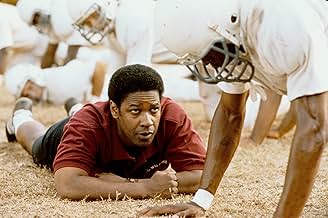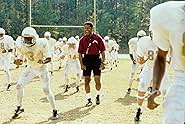La verdadera historia de un entrenador afroamericano recién nombrado y su equipo de secundaria durante la primera temporada que juegan como una unidad racialmente integrada.La verdadera historia de un entrenador afroamericano recién nombrado y su equipo de secundaria durante la primera temporada que juegan como una unidad racialmente integrada.La verdadera historia de un entrenador afroamericano recién nombrado y su equipo de secundaria durante la primera temporada que juegan como una unidad racialmente integrada.
- Premios
- 8 premios y 17 nominaciones en total
Earl Poitier
- Blue Stanton
- (as Earl C. Poitier)
David Jefferson
- Cook
- (as David Jefferson Jr.)
Preston Wigasi Brant
- Jerry Buck
- (as Preston Brant)
John Michael Weatherly
- Kirk Barker
- (as Michael Weatherly)
Argumento
¿Sabías que...?
- CuriosidadesAccording to Coach Herman Boone in an article published by ESPN, he really did integrate the buses before they left for football camp. Boone said "I forced them on each other, I forced them to learn each other's culture. I forced them to be a part of each other's lives."
- PifiasDuring a game sequence, an opposing running back runs a sweep. He fumbles the ball which is picked up by a Titan player, who runs it in for a touchdown, the wrong way.
- Citas
Coach Boone: I don't scratch my head unless it itches and I don't dance unless I hear some music. I will not be intimidated. That's just the way it is.
- Créditos adicionalesHome movies are shown of each person, when they state what happened to them after the '71 season.
- Versiones alternativasIn 2006, a director's cut was released on DVD. That version runs approx. six minutes longer.
- Banda sonoraThem Changes
Written by Buddy Miles (as George Buddy Miles)
Performed by Buddy Miles
Courtesy of The Island Def Jam Music Group
Under license from Universal Music Enterprises
Reseña destacada
Being a former white athlete and coach I am sick of sports movies where the story involves a team eventually winning a championship so I passed this one by when it first came out. Big mistake!! Like "Hoosiers" this one was an exception and what an exception. Remember the Titans is in my top five movies of the past ten years. Denzel Washington, as the coach, gave another of his consistently outstanding performances.
Like "Hoosiers" this is a true story and it is not just a story about sports but a strong story about race. I probably appreciated it more than most because of my background I connected to the movie. During the 1940s I attended schools which were well integrated and students of different races and cultures existed harmoniously. To a large degree, it was because the high school had a very successful football program in which unlike almost all of the other schools, minority athletes were welcome. In my junior year we went undefeated and won the State Championship and the team is still considered the best high school team of all time. The only time the team came close to defeat was in the State final when we played another well integrated team.
Consequently the community while generally middle and upper class except for its minorities was well integrated. As a result although I knew racism existed, I never encountered it in my community. But then I began to see its ugly head. First, the All-American end on our team, a superb athlete, was denied scholarships both to USC and Stanford because neither school accepted minorities. I had always wanted to go to USC but because of what USC did to my friend I turned down its offer of a scholarship the next year as I did to Stanford which I considered a snob school then as I do today.
But my college was cut short when the Korean War began and I was in the service. I was sent to bases in the South and I spent much of the next thirteen years in the South witnessing how bad it was for the blacks and I was involved in the civil rights movement in the South which got me into a lot of trouble with my military superiors.
During my tours in the South I became head coach of a football team at a Southern base. Filled with ex-collegiate stars and some pros, we regularly played Division I colleges and universities. However, because I had black players on my team I couldn't schedule games with any white southern colleges. Instead we scheduled one black college and several state universities in the mid-west.
Some critics have compared the summer camp at which Washington as Coach Boone brought the blacks and whites together as a team as like a Marine Boot Camp but everyone missed the subtlety of this. I went through Boot Camp at a time when the military was just integrating and we had southern blacks and whites as well as a mix of races from other parts of the country in my platoon as well as all classes. It didn't take very long for us to become as one unit. The first part of boot camp is sure hell and the reason for it is that it reduces everyone to the lowest common denominator of misery and you quickly learn that the only way to escape that misery is to work together. This is just the way Coach Boone made it work.
What I liked about this movie is that it showed how all this played out. Most moviegoers today are not really aware of how bad racism was in 1971 but this movie illustrates it well. Even though the movie has a few corny moments and the actors playing the roles as football players look old for high school, these faults are minimal and do not detract from the power of the film.
Like "Hoosiers" this is a true story and it is not just a story about sports but a strong story about race. I probably appreciated it more than most because of my background I connected to the movie. During the 1940s I attended schools which were well integrated and students of different races and cultures existed harmoniously. To a large degree, it was because the high school had a very successful football program in which unlike almost all of the other schools, minority athletes were welcome. In my junior year we went undefeated and won the State Championship and the team is still considered the best high school team of all time. The only time the team came close to defeat was in the State final when we played another well integrated team.
Consequently the community while generally middle and upper class except for its minorities was well integrated. As a result although I knew racism existed, I never encountered it in my community. But then I began to see its ugly head. First, the All-American end on our team, a superb athlete, was denied scholarships both to USC and Stanford because neither school accepted minorities. I had always wanted to go to USC but because of what USC did to my friend I turned down its offer of a scholarship the next year as I did to Stanford which I considered a snob school then as I do today.
But my college was cut short when the Korean War began and I was in the service. I was sent to bases in the South and I spent much of the next thirteen years in the South witnessing how bad it was for the blacks and I was involved in the civil rights movement in the South which got me into a lot of trouble with my military superiors.
During my tours in the South I became head coach of a football team at a Southern base. Filled with ex-collegiate stars and some pros, we regularly played Division I colleges and universities. However, because I had black players on my team I couldn't schedule games with any white southern colleges. Instead we scheduled one black college and several state universities in the mid-west.
Some critics have compared the summer camp at which Washington as Coach Boone brought the blacks and whites together as a team as like a Marine Boot Camp but everyone missed the subtlety of this. I went through Boot Camp at a time when the military was just integrating and we had southern blacks and whites as well as a mix of races from other parts of the country in my platoon as well as all classes. It didn't take very long for us to become as one unit. The first part of boot camp is sure hell and the reason for it is that it reduces everyone to the lowest common denominator of misery and you quickly learn that the only way to escape that misery is to work together. This is just the way Coach Boone made it work.
What I liked about this movie is that it showed how all this played out. Most moviegoers today are not really aware of how bad racism was in 1971 but this movie illustrates it well. Even though the movie has a few corny moments and the actors playing the roles as football players look old for high school, these faults are minimal and do not detract from the power of the film.
- jackjack-2
- 12 mar 2006
- Enlace permanente
Selecciones populares
Inicia sesión para calificar y añadir a tu lista para recibir recomendaciones personalizadas
Detalles
- Fecha de lanzamiento
- País de origen
- Sitio oficial
- Idioma
- Títulos en diferentes países
- Duelo de titanes
- Localizaciones del rodaje
- Covington, Georgia, Estados Unidos(Downtown Alexandria scenes)
- Empresas productoras
- Ver más compañías en los créditos en IMDbPro
Taquilla
- Presupuesto
- 30.000.000 US$ (estimación)
- Recaudación en Estados Unidos y Canadá
- 115.719.751 US$
- Fin de semana de estreno en EE. UU. y Canadá
- 20.905.831 US$
- 1 oct 2000
- Recaudación en todo el mundo
- 136.771.683 US$
- Duración1 hora 53 minutos
- Mezcla de sonido
- Relación de aspecto
- 2.39 : 1
Contribuir a esta página
Sugerir un cambio o añadir el contenido que falta

Principal laguna de datos
What is the streaming release date of Titanes: Hicieron historia (2000) in India?
Responde
































